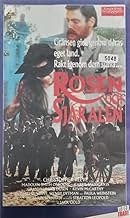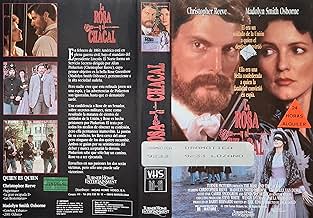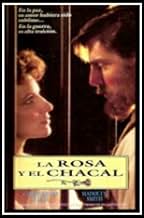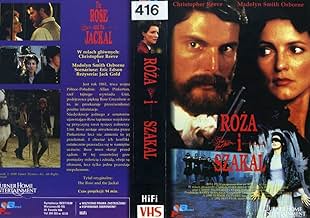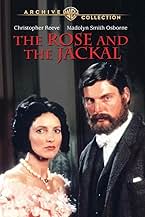IMDb-BEWERTUNG
5,6/10
169
IHRE BEWERTUNG
Füge eine Handlung in deiner Sprache hinzuUnion detective Allan Pinkerton falls in love with an aristocrat caught spying for the Confederacy.Union detective Allan Pinkerton falls in love with an aristocrat caught spying for the Confederacy.Union detective Allan Pinkerton falls in love with an aristocrat caught spying for the Confederacy.
- Auszeichnungen
- 1 Nominierung insgesamt
Haynes Brooke
- Lieutenant Lawrence Nevins
- (as Haynes Brook)
Handlung
WUSSTEST DU SCHON:
- WissenswertesChristine Lakin's film debut.
- VerbindungenReferenced in Wogan: Folge #9.143 (1989)
Ausgewählte Rezension
There are a certain bunch of actors and actresses whose fates will always color our appreciation of their performances. When we watch Rock Hudson in all his sex comedies with or without Doris Day, our knowledge of his homosexuality and his death from the ravishes of A.I.D.S. will always interfere with watching his work. Similarly, questions about the suicide of Marilyn Monroe or the drowning of Natalie Wood will always bother our pleasures at their films, as will thoughts about the premature death of Jean Seaberg. Even if the actor leaves a tremendous film heritage, like Leslie Howard, his death in a plane crash will make us wonder what further glorious performances he would have given us (as does that of his contemporary Carole Lombard).
Chris Reeve is in this bunch too. He was lucky to have fit early into a character part that identified him to his generation. As Basil Rathbone was Sherlock Holmes in the 1940s, and Sean Connery was James Bond in the 1960s and early 1970s, Reeve was Superman to the generation born from 1954 to 1972. It helped him that he had nearly the same name as George Reeves, the actor who had made the same part his own on the successful television series in the 1950s. But if one believes in curses, there must have been one attached to that part for actors with names spelled with "R", "E" "E" "V" and "E". Both men came to tragic fates. George either shot himself or was murdered (the verdict is still out). Chris may have had a worse fate - he was left permanently crippled after a horse riding accident, and became more involved with stem cell research and spinal surgery than he probably ever thought he would be when he was growing up. In a sense his mission in that last decade colored his entire career and remains his monument. It is a pity, for Chris Reeve was an above average actor and director (he even won an Emmy for his directing a remake of REAR WINDOW), and his entertainment career was really curtailed by the accident that ruined his spine.
Before his accident, he made this film for Ted Turner in 1990. Turner was producing a series of movies about the American Civil War for his cable network, and decided to deal with the Civil War careers of two famous spies. The northern one, played by Reeves, was the railroad detective Allan Pinkerton. The southern one, played by Madelyn Smith Osborne, was Rose O'Neill Greenhow.
Let me say this - the film is well acted and directed. Reeve manages to make us appreciate Pinkerton's abilities as a detective (who eventually founded the largest private detective firm in the world) quite early. The Scottish immigrant had gotten the attention of two men in Illinois when heading the railroad police for the Illinois Central Railroad. One was the line's attorney, Abraham Lincoln. The other was the line's President, George Brinton McClellan. When Lincoln was headed for Washington for his inauguration in 1861, it was Pinkerton whose operatives foiled the "Fernandina" plot in Baltimore to assassinate the President (see the Dick Powell film, "THE TALL TARGET" for a version of that story). After the inauguration Lincoln made Pinkerton head of the new Secret Service. McClellan, when Commander in Chief and head of the Army of the Potomac, would also use Pinkerton's services gathering information on Confederate strength.
In the film we are concentrating on the events of February to August 1861. In this period McClellan is not involved in events in Washington. But when Pinkerton gets Lincoln safely to the capital, he is appointed to head the Secret Service. He goes to one of the last dinners given at the White House by out-going President James Buchanan (Jeff Corey). Buchanan teases and laughs at Pinkerton and his activities, and so annoys the detective that the latter turns on the President and pointedly sneers, "Perhaps if you had been more concerned about intelligence gathering you would not be leaving this office now!" Buchanan does not answer that one.
Rose O'Neal Greenhow was a prominent boarding house owner in Washington, D.C., who was well connected to several leading southern politicians by family or marriage. She became a very effective spy for the south. The film does involve what may have been her supreme success in the war; she managed to get the battle plans of General Irwin McDowell, which enabled the Confederates to defeat him at the first battle of Bull Run. Traditionally it has been suggested that Ms Greenhow romanced the information out of the head of the Military Affairs Committee of the Senate, Massachusetts Senator Henry Wilson (Kevin McCarthy here). Actually we are not fully sure, but the movie supports this particular theory.
We do know that after that military debacle, Mrs. Greenhow was traced by Pinkerton's operatives as a southern spy, and she was imprisoned. Here the film goes off the historical record, suggesting that Rose and Allan fell in love.
SPOILER AHEAD: The film also makes Allan fall so hard for Rose that he helps her escape prison before she was going to be shot. Actually, Rose was never in any danger of that. She had too many friends in high places (despite her politics) to allow that to happen. She got exchanged for a Union operative who was captured. Later in the war Rose went to Europe to try to get medical supplies for the Confederacy. When she returned to North Carolina, in the fall of 1864, her boat got swamped while trying to land and she was drowned.
The film was well produced and acted. A scene of Reeve riding a horse at high speed is a little hard to take nowadays, given what caused his accident. But otherwise the film is worth seeing, even if the "love affair" is just a myth.
Chris Reeve is in this bunch too. He was lucky to have fit early into a character part that identified him to his generation. As Basil Rathbone was Sherlock Holmes in the 1940s, and Sean Connery was James Bond in the 1960s and early 1970s, Reeve was Superman to the generation born from 1954 to 1972. It helped him that he had nearly the same name as George Reeves, the actor who had made the same part his own on the successful television series in the 1950s. But if one believes in curses, there must have been one attached to that part for actors with names spelled with "R", "E" "E" "V" and "E". Both men came to tragic fates. George either shot himself or was murdered (the verdict is still out). Chris may have had a worse fate - he was left permanently crippled after a horse riding accident, and became more involved with stem cell research and spinal surgery than he probably ever thought he would be when he was growing up. In a sense his mission in that last decade colored his entire career and remains his monument. It is a pity, for Chris Reeve was an above average actor and director (he even won an Emmy for his directing a remake of REAR WINDOW), and his entertainment career was really curtailed by the accident that ruined his spine.
Before his accident, he made this film for Ted Turner in 1990. Turner was producing a series of movies about the American Civil War for his cable network, and decided to deal with the Civil War careers of two famous spies. The northern one, played by Reeves, was the railroad detective Allan Pinkerton. The southern one, played by Madelyn Smith Osborne, was Rose O'Neill Greenhow.
Let me say this - the film is well acted and directed. Reeve manages to make us appreciate Pinkerton's abilities as a detective (who eventually founded the largest private detective firm in the world) quite early. The Scottish immigrant had gotten the attention of two men in Illinois when heading the railroad police for the Illinois Central Railroad. One was the line's attorney, Abraham Lincoln. The other was the line's President, George Brinton McClellan. When Lincoln was headed for Washington for his inauguration in 1861, it was Pinkerton whose operatives foiled the "Fernandina" plot in Baltimore to assassinate the President (see the Dick Powell film, "THE TALL TARGET" for a version of that story). After the inauguration Lincoln made Pinkerton head of the new Secret Service. McClellan, when Commander in Chief and head of the Army of the Potomac, would also use Pinkerton's services gathering information on Confederate strength.
In the film we are concentrating on the events of February to August 1861. In this period McClellan is not involved in events in Washington. But when Pinkerton gets Lincoln safely to the capital, he is appointed to head the Secret Service. He goes to one of the last dinners given at the White House by out-going President James Buchanan (Jeff Corey). Buchanan teases and laughs at Pinkerton and his activities, and so annoys the detective that the latter turns on the President and pointedly sneers, "Perhaps if you had been more concerned about intelligence gathering you would not be leaving this office now!" Buchanan does not answer that one.
Rose O'Neal Greenhow was a prominent boarding house owner in Washington, D.C., who was well connected to several leading southern politicians by family or marriage. She became a very effective spy for the south. The film does involve what may have been her supreme success in the war; she managed to get the battle plans of General Irwin McDowell, which enabled the Confederates to defeat him at the first battle of Bull Run. Traditionally it has been suggested that Ms Greenhow romanced the information out of the head of the Military Affairs Committee of the Senate, Massachusetts Senator Henry Wilson (Kevin McCarthy here). Actually we are not fully sure, but the movie supports this particular theory.
We do know that after that military debacle, Mrs. Greenhow was traced by Pinkerton's operatives as a southern spy, and she was imprisoned. Here the film goes off the historical record, suggesting that Rose and Allan fell in love.
SPOILER AHEAD: The film also makes Allan fall so hard for Rose that he helps her escape prison before she was going to be shot. Actually, Rose was never in any danger of that. She had too many friends in high places (despite her politics) to allow that to happen. She got exchanged for a Union operative who was captured. Later in the war Rose went to Europe to try to get medical supplies for the Confederacy. When she returned to North Carolina, in the fall of 1864, her boat got swamped while trying to land and she was drowned.
The film was well produced and acted. A scene of Reeve riding a horse at high speed is a little hard to take nowadays, given what caused his accident. But otherwise the film is worth seeing, even if the "love affair" is just a myth.
- theowinthrop
- 26. Mai 2006
- Permalink
Top-Auswahl
Melde dich zum Bewerten an und greife auf die Watchlist für personalisierte Empfehlungen zu.
Details
- Laufzeit1 Stunde 30 Minuten
- Farbe
- Seitenverhältnis
- 1.33 : 1
Zu dieser Seite beitragen
Bearbeitung vorschlagen oder fehlenden Inhalt hinzufügen

Oberste Lücke
By what name was Die Liebe einer Spionin (1990) officially released in Canada in English?
Antwort
